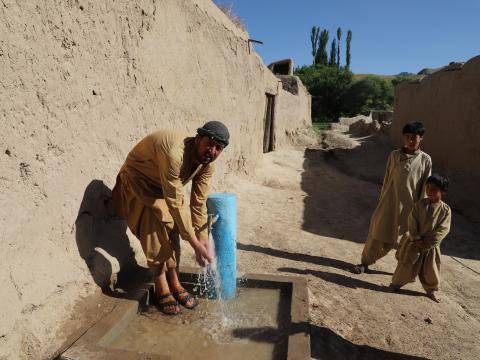With Water Comes Tranquility

The problem of clean water has plagued Qudrat since he was a child. “I remember a day when I was 12 years old; I waited the whole day to fetch water, but then the sky became dark and it was late, so I [was forced to turn back] home.” Now 23, Qudrat has a family of his own and works as a farmer.
Traditionally, women and children share most of the burden of water collection, and contaminated water has had a negative impact on children’s health in this part of Afghanistan. “My brother always felt weak,” Qudrat remembers. “When we went to the doctor [we were told] that it was the effect of using unclean water” resulting in diarrhea and dehydration. Additionally, the stream is located in an area without shade and children often get headaches as a result of standing for hours under the punishing sun.
But real change is afoot. This year, for the first time, a water supply network has been installed in Qudrat’s village of Chaprodha, in Badghis Province. Previously, villagers relied solely on river water to drink and use for other purposes. When the river dried up seasonally, they were forced to go to surrounding villages to fetch water, spending hours waiting in long lines.
As part of a water, sanitation and hygiene (WASH) project funded by UNICEF, World Vision Afghanistan (WVA) managed the installation of a solar-powered water supply network in Chaprodha. The water, fed by an aquifer 24 metres underground, flows from the borehole to 12 tap stands located throughout the village, providing easy access for up to 178 families.
Bahawodin, 43, is head of Chaprodha village. He says, “Thanks to World Vision [we can now] access potable water. They drilled a borehole and linked it to the solar system.” Community members received income working to complete the system. “Now we have 10 water taps in our village and it is our first time drawing water from a tap.” The water supply system also positively impacted children’s school attendance. As Bahawodin explains, “Children used to fetch water during their classes and [frequently missed] their lessons due to this responsibility. Now they are more active” and have more time to learn.
Qudrat is relieved that he won’t have to sacrifice precious working hours to fetch water. “I used to waste all day waiting in the line, but now [the tap] is close to my house so any member of my family can fetch water easily,” he says.
WV established water management groups who are responsible for maintaining the systems. Additionally, Villagers are resolved to do whatever is necessary to maintain the water supply system and to reduce water wastage as each drop is precious.